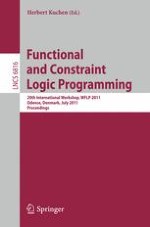This book constitutes the refereed conference proceedings of the 20th International Workshop on Functional and Constraint Logic Programming, WFLP 2011, held in Odense, Denmark, in July 2011 as Part of the 13th International Symposium on Principles and Practice of Declarative Programming (PPDP 2011), the 22st International Symposium on Logic-Based Program Synthesis and Transformation (LOPSTR 2011), and the 4th International Workshop on Approaches and Applications of Inductive Programming (AAIP 2011). From the 10 papers submitted, 9 were accepted for presentation the proceeding. The papers cover current research in all areas of functional and logic programming as well as the integration of constraint logic and object-oriented programming, and term rewriting.
